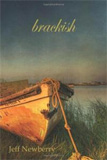October 25, 2013BRACKISH
Review by Karen J. Weyant
Aldrich Press
1840 West 220th Street, Suite 300
Torrance, California 90501
ISBN 9780615705637
2012, 102 pp., $14.00
aldrichbookpublishing.blogspot.com
I grew up in rural Pennsylvania and poet Jeff Newberry is from northern Florida, so at first glance, it may seem a bit confusing as to why I knew the world depicted in Newberry’s book, Brackish. However, when I opened the collection to the first poem, “To Come of Age in a Mill Town,” I felt that I was standing on the bridge that divided my little town in two, staring at the morning fog, smelling the sulfur infused air that drifted from the paper mill town that rested seven miles north from my childhood home. In his first full length collection of poetry, Newberry takes the reader into the towns that rest in the panhandle of Florida—a land far away from the tourists of Disney World and the sandy beaches filled with bronzed bodies and bikinis.
The poem “Childhood” establishes both the tone and setting for the collection. In this poem, we learn about a blue collar family where a young boy spends his nights listening to his father’s “snores echo down the dark hallway.” His home is nestled in a paper mill town, as explained by the narrator who describes the paper mill smoke stacks by metaphor: “Some nights, they are missiles. Some nights, the smoke unfolds in mushroom blossoms.” This world invades his home: “My room reeks: the factory-churned sulfur, pine wood/ mulch, the ever stinking mill.” Even as a child, the narrator feels stifled in his world, almost as if he is suffocating: “I wake up & want to scream, but my father has to work/ tomorrow.”
Later, we learn more about the narrator’s father who is a butcher. Indeed, many of the poems in Brackish are dedicated to exploring the narrator’s relationship with his father and his father’s world. In “At the End of the Day” we see a physical description: “He grows old, his skin fades/ to the sterile white of Styrofoam/ like the trays he uses to wrap/cutlets in cellophane.” In another poem, “Pay Day,” the speaker describes his father at home: “Stripped of his butcher’s white/ he still stinks of steaks & blood.” The son examines his relationship with his father through several other poems, including “The Butcher’s Son” where the main character …
wants
to lay out memories in neat rows
like flank steaks. He wants to openthe past like butterfly pork chops
& wrap them tight in cellophane.
Still, it’s important to note that it’s not just work that rules this narrator’s world. Several poems are devoted to playing music and fishing—obviously two activities that are very important in this setting. Often these poems investigate the relationship between the narrator and his father. For instance, in “My Father, Fishing” we find out why fishing is so important to the narrator: “I know my father only in shadows/ before work” and “These quiet trips to the water’s edge.” In these moments, the narrator mimics his father in silence, dropping his own line “into darkness.” Other poems chronicle the father’s love of music: “He twangs & twists, wraps his hulking bulk/ around the six-string strained body.” The narrator, who is not allowed to touch the guitar, still wants to find connection with his father: “I try to match his hummed/ tones, tune my voice to his whisper.”
Newberry does more than just write personal narratives; he goes to great length to explore this world of blue collar life. Often, these stories are told through other people. We have the paper mill world represented as a physical presence, but also in such part of family life as depicted in “Factory Boy,” where a father comes home after second shift smelling of “paper & ammonia.” We also learn about the past; for example, in “Share Cropping” we learn about his mother: “My mother told me cotton burs tore/ her fingers open, pocketed wounds/ that bled for days after.” There is no doubt that the characters in this collection have ties to the past as they struggle towards a dubious future, and that the present world is teetering on the edge, threatening to collapse, class lines drawn through mud and old fishing line and oyster shells. Perhaps my favorite poem in this collection is “After School, I Never Walked Home,” where the narrator drives with this mother toward the west part of town “where trailer parks/ squatted in afternoon heat & asphalt/ gave way to oyster shell & sand.” The mother’s effort to separate her son from the other children is fruitless as the young boy looks at the children in the buses and sees those “my mother called them & I called we.”
Reading Brackish, it becomes clear that place is not just a setting, but its own character in this book. Indeed, through several poems with titles such as “Poem for Wewahitchka, Florida,” “Poem for Apalachicola, Florida,” and “Poem for Destin, Florida” we see elegies disguised as odes for gulf towns and cities. The most heartfelt poem is “Elegy for Port St. John, Florida,” where a driver is addressed in the second person point of view:
Your father said it would be this way
you’d miss this place, this sea walled
village by the bay, where you once
prayed for anything to take you away.
In essence, Brackish is a coming-of-age collection. Through personal narratives and stories told from the past, readers watch a young boy growing up to come to terms with his place in this world. The landscape found in this collection is so vivid that when I was done reading, I could smell paper mills and fish. I could taste the salt of the ocean. I could hear music, a folksy hum that is not quite in tune. I could feel a fishing line between my thumb and fingers, a thin line tugging me, pulling me back in.